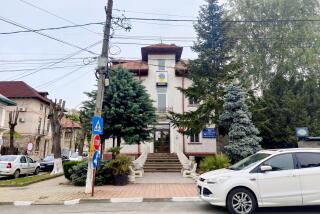Romanian Acrobats Who Defected Now Have Down-to-Earth Concerns
- Share via
Acrobat Georgeta Serban once was cheered by thousands when she performed for the Ringling Bros. and Barnum & Bailey Circus.
Today, the 27-year-old Serban works nights as a weight trainer at a Fullerton health club.
The adjustment hasn’t been easy, she says. In the three months since she and three other Romanian acrobats slipped away from the circus to a waiting car and became political defectors, the change has been tougher than expected.
“I miss everything about the circus--the smell, the animals, the life of traveling--and the mystery,” Serban said. “It was like a family.”
Her friend, Angela Petrescu, 32, who escaped with her from the circus that day, lives on $311 a month in welfare while she learns to speak English so she can get a job, she explained through Serban, who studied English for five years in her native Romania and spoke fluent English during a recent interview in Fullerton.
The two are living rent-free in the home of Bill and Olga Neighbors until they can support themselves. Olga Neighbors, 48, said she tries to help immigrants from communist countries because she came to the United States from the Soviet Union in 1953.
Juliana Dumitrescu, 33, and her 13-year-old daughter, Brigitta, the two other acrobats who defected Aug. 6, declined to be interviewed.
The Dumitrescus, said Olga Neighbors, did not want to talk about their experiences because “they want to put everything behind them. . . . And they are worried about repercussions to their family in Romania if they talk to the press.”
Serban and Petrescu said they have been criticized for leaving their husbands--and in Petrescu’s case, a 15-year-old daughter. Some people have suggested that they defected for financial reasons.
That questioning of their motivations has continued even though the U.S. government granted them political asylum Aug. 14. Verne Jervis, a spokesman for the Immigration and Naturalization Service in Washington, D.C., said the agency determined that the women “were in physical danger from their government back home and had a well-founded fear of persecution (if they returned).”
Serban said she is tired of explaining why she used the circus’s tour through Southern California, where she knew a friend in Tustin who would help, as an opportunity to defect.
“I defected from my country because I didn’t like the government and its laws. . . . There was no freedom. The government would not let you believe in God,” she said. “I am an Orthodox Romanian, and I found it difficult to practice my beliefs.”
Serban would not talk about her husband. But she misses her parents and sister in Romania. “I hope to see them again, but I’m sure it won’t be for years,” she said.
Petrescu said her husband, Vasile Petrescu, 56, was the boss of the acrobats’ teeterboard act, and is still touring the country with Ringling Bros.
She said she did not tell her husband of her plans to defect. “He has been traveling with the circus for years, and has been to Western Europe, China and Japan,” Petrescu said. “I was sure he would be going back home.”
The two have not talked since since her defection, she said, and their eight-year marriage probably will end in divorce. But she hopes one day to be reunited with her 15-year-old daughter, Alana, who lives with Petrescu’s parents in Romania. Alana’s father was Petrescu’s her first husband, who is now dead.
“I miss my daughter a lot,” she said. “I talk to her (by telephone) every Sunday. . . . I’m sure she misses me.”
Petrescu said she has heard criticism that “I’m here for money and that I’m a bad person for leaving my husband. I don’t think it’s right for people to think like that.
“It’s a tough decision, and only we know how hard it is to leave a child, husband and family. We are suffering very much. But sometimes you have to suffer for your freedom and for your dreams.”
Still, Serban said, she does not regret her decision.
“Life’s not a rose garden. You have to try and try, and fight for everything worth having in this life.”
Petrescu said she also has found adjustment difficult. Four nights a week she attends English classes offered by the Fullerton public schools. Petrescu, who last attended school 15 years ago, said she finds the three-hour sessions and homework assignments grueling.
But she said the adjustment has been eased somewhat by the Romanian community in Southern California. She regularly attends a Romanian Baptist Church in Fullerton.
“I was in a grocery store in Los Angeles, and I heard my language,” Petrescu said. “I was so happy and surprised that I just turned around and started talking right away with the two men. . . . It was like being back home.”
More to Read
Sign up for Essential California
The most important California stories and recommendations in your inbox every morning.
You may occasionally receive promotional content from the Los Angeles Times.













